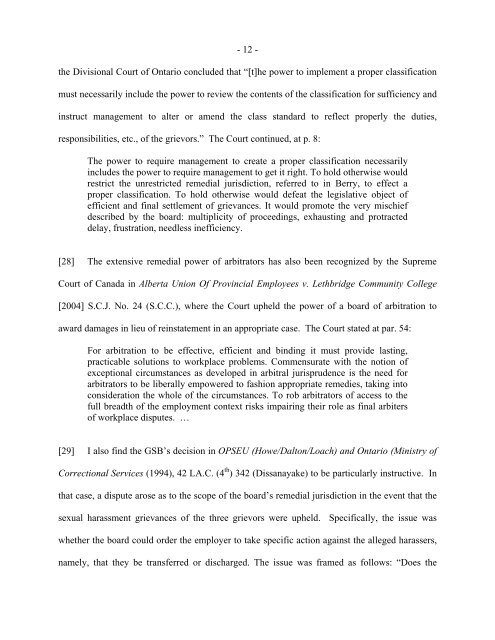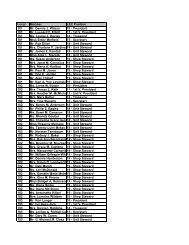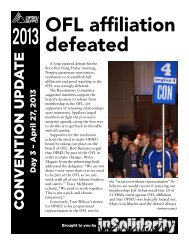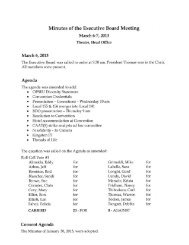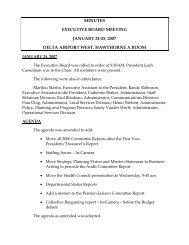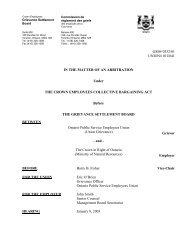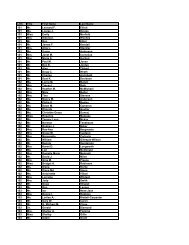2009 - OPSEU (Hunt et al) and Ministry of Attorney General, GSB ...
2009 - OPSEU (Hunt et al) and Ministry of Attorney General, GSB ...
2009 - OPSEU (Hunt et al) and Ministry of Attorney General, GSB ...
- No tags were found...
Create successful ePaper yourself
Turn your PDF publications into a flip-book with our unique Google optimized e-Paper software.
- 12 -the Division<strong>al</strong> Court <strong>of</strong> Ontario concluded that “[t]he power to implement a proper classificationmust necessarily include the power to review the contents <strong>of</strong> the classification for sufficiency <strong>and</strong>instruct management to <strong>al</strong>ter or amend the class st<strong>and</strong>ard to reflect properly the duties,responsibilities, <strong>et</strong>c., <strong>of</strong> the grievors.” The Court continued, at p. 8:The power to require management to create a proper classification necessarilyincludes the power to require management to g<strong>et</strong> it right. To hold otherwise wouldrestrict the unrestricted remedi<strong>al</strong> jurisdiction, referred to in Berry, to effect aproper classification. To hold otherwise would defeat the legislative object <strong>of</strong>efficient <strong>and</strong> fin<strong>al</strong> s<strong>et</strong>tlement <strong>of</strong> grievances. It would promote the very mischiefdescribed by the board: multiplicity <strong>of</strong> proceedings, exhausting <strong>and</strong> protracteddelay, frustration, needless inefficiency.[28] The extensive remedi<strong>al</strong> power <strong>of</strong> arbitrators has <strong>al</strong>so been recognized by the SupremeCourt <strong>of</strong> Canada in Alberta Union Of Provinci<strong>al</strong> Employees v. L<strong>et</strong>hbridge Community College[2004] S.C.J. No. 24 (S.C.C.), where the Court upheld the power <strong>of</strong> a board <strong>of</strong> arbitration toaward damages in lieu <strong>of</strong> reinstatement in an appropriate case. The Court stated at par. 54:For arbitration to be effective, efficient <strong>and</strong> binding it must provide lasting,practicable solutions to workplace problems. Commensurate with the notion <strong>of</strong>exception<strong>al</strong> circumstances as developed in arbitr<strong>al</strong> jurisprudence is the need forarbitrators to be liber<strong>al</strong>ly empowered to fashion appropriate remedies, taking intoconsideration the whole <strong>of</strong> the circumstances. To rob arbitrators <strong>of</strong> access to thefull breadth <strong>of</strong> the employment context risks impairing their role as fin<strong>al</strong> arbiters<strong>of</strong> workplace disputes. …[29] I <strong>al</strong>so find the <strong>GSB</strong>’s decision in <strong>OPSEU</strong> (Howe/D<strong>al</strong>ton/Loach) <strong>and</strong> Ontario (<strong>Ministry</strong> <strong>of</strong>Correction<strong>al</strong> Services (1994), 42 LA.C. (4 th ) 342 (Dissanayake) to be particularly instructive. Inthat case, a dispute arose as to the scope <strong>of</strong> the board’s remedi<strong>al</strong> jurisdiction in the event that thesexu<strong>al</strong> harassment grievances <strong>of</strong> the three grievors were upheld. Specific<strong>al</strong>ly, the issue waswh<strong>et</strong>her the board could order the employer to take specific action against the <strong>al</strong>leged harassers,namely, that they be transferred or discharged. The issue was framed as follows: “Does the


